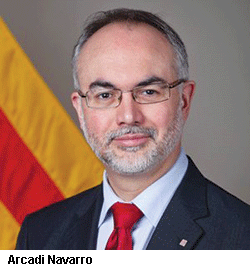 Catalonia’s referendum has brought into sharp focus the potential benefits of independence for science in the region, but it has also highlighted the potential pitfalls that researchers could face if relations between the separatist region and Madrid sour further.
Catalonia’s referendum has brought into sharp focus the potential benefits of independence for science in the region, but it has also highlighted the potential pitfalls that researchers could face if relations between the separatist region and Madrid sour further.
Catalonia is one of Spain’s richest regions, providing 19 percent of Spain’s gross domestic product. It’s home to thriving industry, several top universities and research centres, and punches well above its weight in terms of the excellence of its research.
For example, Times Higher Education analysis of Catalan universities’ performance in the World University Rankings (WUR) shows that the region is third behind only the Netherlands and Sweden in terms of average scores for the citation impact of institutions’ research, among countries with at least five entries in the table. On the same measure, the rest of Spain without Catalonia, meanwhile, ranks #25. In the most recent round of European Research Council grants for early career researchers, ten of the 22 awards for scientists based in Spain went to those at institutions in Catalonia, despite the region comprising just 16 percent of the country’s population.
Advocates of independence argue that Catalonia’s government has already acted to free universities from some of the bureaucracy that hampers academic recruitment and promotion in the rest of Spain, and claim that independence would allow this process to be accelerated.
Arcadi Navarro, secretary for universities and research in the Catalan government, says that independence would enable him to implement policy measures that Madrid has so far banned. “They would include the development of a fiscal policy encouraging private donations, whose treatment is now worse than in many other European countries,” says Prof. Navarro, director of the department of experimental and health sciences at Barcelona’s Pompeu Fabra University. “Also, we would leverage on private investments to ensure that knowledge better reaches society.” These would be possible only if the Catalan government had control over tax legislation, and the power to regulate credit operations and the mechanisms for venture capital, adds Navarro.
Many credit Andreu Mas-Colell, emeritus professor of economics at Pompeu Fabra, as the architect of the current research system in Catalonia. Prof. Mas-Colell, who served as Catalonia’s minister of economy and knowledge from 2010-2016, believes the Catalan government places higher priority on research than the Spanish government.
“Anything that gives the Catalan government more fiscal resources is good for research in Catalonia,” says Prof. Mas-Colell. However, he cautions that funding would remain a key concern even after independence. “The research system has been quite efficient in transforming core support from the Catalan government into budgets that on average are three times larger. This is hard to improve,” he says.
There are shorter-term concerns, too. In the weeks leading up to October 1, the Spanish ministry of finance and civil service took measures to take control of the financial affairs of universities and research centres. “These measures are unjustified, unnecessary and they are endangering academic activities in Catalonia,” says Navarro, adding that they “damage the credibility” of the institutions and individuals working on international projects.
(Excerpted and adapted from The Economist and Times Higher Education)























